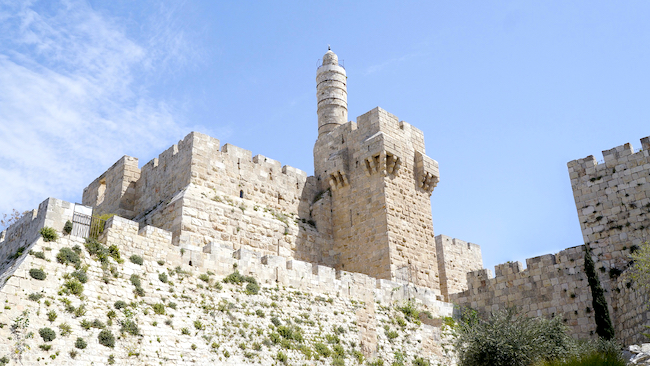
VA’EIRA
Yechezkel 28:25–29:21
The Curse of Self-Dependency
Rainfall in Eretz Yisrael is a scarce and precious commodity. One often
wonders why Hashem did not provide His special land with a plentiful source of
water in the same manner that He provided the land of Egypt. This week’s
Haftarah relates to this subject and teaches us a profound lesson in arrogance
and self-dependence.
Egypt’s Arrogant Attitude
Yechezkel Hanavi delivered a crushing, prophetic blow to the Pharaoh of his times
and his mighty kingdom, and he predicted their downfall and destruction. Yechezkel told
Pharaoh in Hashem’s name “Behold I am bringing the sword against you; I will destroy
man and animal from you. The land of Egypt will lay desolate and ruined…in response to
your stating, ‘The irrigation canal [Nile River system] is mine and I have developed it
[literal reading: developed myself].’” (29:8-9) Pharaoh’s words displayed Egypt’s arrogant
attitude towards its source of prosperity.
The reason for Egypt’s arrogance was based on its unique reliance on its Nile River.
Rainfall in Egypt is so scarce that it was compelled to develop an extensive irrigation
system to meet its basic agricultural needs. Its overflowing Nile River and its respective
tributaries provided the perfect solution for its problem. Egypt became so accustomed to
its ingenious water system that its people began perceiving themselves as totally self-
sufficient. They viewed the Nile River as their sole provider, and they credited their
Pharaoh with the status of a deity. He was, in truth, responsible for the efficiency of their
system, and he could, therefore, be justifiably identified as the source of their goodness.
Pharaoh readily accepted his title and, following his people’s lead, claimed the Nile as
his creation and accepted his deity status. Hashem responded to Pharaoh’s arrogance
and informed him that his kingdom’s days were numbered. The time had arrived for his
empire to fall and for Egypt to lay desolate for forty years.
Self-Creation
Pharaoh’s outlandish claim to the Nile finds its parallel in this week’s Parsha. The
Torah refers to an auspicious meeting place for Moshe Rabbeinu and Pharaoh. Hashem
instructed Moshe, “Go to Pharaoh in the morning; behold he is going out to the water.”
(Shemos 7:15) Moshe was given explicit instructions to meet Pharaoh far away from his
royal palace, at the foot of the Nile River. Chazal explain that Hashem chose that
particular meeting place in order to refute Pharaoh’s arrogant claim to the masses that
was a deity and that he was not subject to bodily needs. In order to preserve his myth,
he woke early each morning and secretly traveled to the Nile River to attend there to his
physical needs. Hashem chose that auspicious time and place to send His faithful
servant, Moshe, to speak to mighty Pharaoh and remind him of his mortality and to
inform him that his secret identity had been discovered. (Rashi to Shemos 7:15)
Forty Two Years of Famine
In truth, the parallel lines between the Pharaoh of Yechezkel’s time and the Pharaoh
in the Torah extend much further, and we find a direct link between their experiences. In
our Haftarah Yechezkel prophesized mighty Egypt’s downfall and stated in Hashem’s
name, “Behold I am turning against you and your river. I will render Egypt ruined and
desolate… Neither man nor animal shall pass through the land for forty years.” (29:10-
11) Chazal take note of the specific number forty that Yechezkel predicted for Egypt, and
they draw our attention to the discussions in the Torah between Yosef and Pharaoh in
which seven years of famine were mentioned six times, totaling forty-two years. Chazal
explain that those years reflected Hashem’s intent to decree forty-two years of famine on
Egypt. (Bereishis Rabba 89:9) Yet, as we know, only seven years of famine were
decreed upon Egypt, in Yosef’s times.
Tosfos explain that the reduction of years was a result of Yosef’s intervention. Yosef
beseeched Hashem for only seven famine years to materialize in Yosef’s lifetime.
Hashem acquiesced and directed Yosef to predict only seven years of famine for
Pharaoh, at that time. (Daas Zekainim on Bereishis 41:27) Chazal add that, in fact, only
two years of famine actually transpired due to our patriarch Yaakov’s intervention. When
Yaakov arrived in Egypt he blessed Pharaoh with prosperity and the famine came to an
immediate halt. (from Rashi to Bereishis 47:19) Accordingly, forty years of famine were
put on hold and reserved for a later period of time when Egypt would deserve its full
share of retribution. In Yechezkel’s days, the time did arrive for Egypt to receive its full
share and Hashem decreed upon it the remaining predicted forty years of famine.
History Repeated
Chazal’s insight suggests that, during Yechezkel’s days, Egypt suffered for a fault it
had committed nearly one thousand years earlier. Egypt’s behavior during Yechezkel’s
days seemed to have mirrored its behavior in previous times. It follows logically then,
that the Pharaoh in Yosef’s days must have adopted a similar approach to prosperity to
that of the Pharaoh in Yechezkel’s days. Indeed, we can ascertain this fact from a subtle
discrepancy in the way that Pharaoh relayed his dream to Yosef. The Torah records that
Pharaoh dreamt that he was standing “above” the Nile River. Yet, when he relayed his
dream to Yosef, Pharaoh said that he beheld himself standing “next” to the Nile. Chazal
explain that Pharaoh believed he possessed supernatural powers and that he took full
credit for the Nile River. (Bereishis Rabba 89:3 and Rashi ad loc) Although he dreamt
that he was standing above the Nile, he was embarrassed to reveal his arrogance to
Yosef and he therefore conveniently omitted that trivial nuance.
We discover here a direct corollary between the Pharaohs, all claiming to be the sole
source of their prosperity. Hashem initially responded to the Pharaoh in Yosef’s times
and to his arrogant attitude of self-dependency, and He decreed upon Egypt forty-two
years of desolation. That experience was meant to teach Pharaoh and his empire that
Hashem controlled prosperity and not Pharaoh. For forty-two years the Nile would be of
no benefit to Egypt, and its people would clearly recognize that Hashem was their true
provider, not the Nile River or Pharaoh.
Pharaohs Never Learn
We could suggest that the Pharaoh of those days and his kingdom quickly learned
their lesson. Pharaoh’s mysterious dreams and Yosef’s perfect interpretation of them
convinced Pharaoh that Hashem controlled Egypt’s prosperity. Pharaoh responded
favorably to his lesson and even entrusted his entire land in the hands of Hashem’s
devout emissary, Yosef. Once Pharaoh was willing to take that major step, Hashem
immediately suspended the remaining forty years of famine for a later time.
During the Jewish People’s extended stay in Egypt a new Pharaoh rose to power and
developed a hostile attitude towards Hashem’s precious children. In addition to following
the Pharaoh tradition, claiming the Nile as his creation, the new Pharaoh denied
Hashem’s existence and ruthlessly persecuted Hashem’s precious children. After
Pharaoh repeatedly ignored Hashem’s warnings, Hashem responded to Pharaoh’s
arrogant attitude and He delivered Egypt its famous ten plagues. Hashem began the
plagues by transforming the Nile River into blood thereby totally shattering Egypt’s myth
about its source of prosperity and its Pharaoh. After Egypt’s world famous experience it
could not raise its head in pride, and it did not take part in the world scene for hundreds
of years afterwards.
But, after nearly one thousand years, Egypt managed to forget Hashem’s harsh
lesson and returned to its ancient ways. After successfully rebuilding its empire, it felt a
sense of security and pride. In the height of its success, its mighty Pharaoh decided to
revert to the practices of his ancestors and to declare the Nile River as Egypt’s sole
provider. He, like the earlier Pharaohs, maintained that the Nile was his creation and that
he developed it, as well as himself. At that point, Hashem refused to tolerate Egypt’s
arrogant attitude and immediately decreed upon Egypt its remaining forty years of
famine. Through that encompassing blow, Hashem reminded Egypt and all of mankind
that He was the controller of the world and that even Egypt depended upon Him for
prosperity.
Hashem’s Blessing of Dependency
In Sefer Devarim, Moshe Rabbeinu told the Jewish People, “For the land that you are
coming to inherit is not like the land of Egypt where you sow it and you water it with your
feet [from a channel] like a garden… [It is a] land of mountains and valleys [that] drink
water from the rain of the heavens.” (Devarim 11:10-11) Ramban explains that due to
Eretz Yisrael’s geographical constitution it can only receive ample water through rainfall.
Moshe Rabbeinu told the Jewish nation that Hashem arranged that phenomenon to
secure His relationship with His people. If they wished to prosper therein, they would be
forced to turn to Him and to request rain from Him. But, if they found -Heaven forbid –
difficulty in recognizing their true provider, Hashem did not arrange for them any
alternate source of provision in His land. (Ramban to Devarim 11:10)
Now that we have traced Egypt’s downfall to its stubborn arrogance and self-
dependence, we can appreciate Eretz Yisrael’s unique geographic structure. Hashem
graciously structured Eretz Yisrael in a form of absolute dependency replete with hills
and mountains, lacking a large free flowing river in the center of its land. Eretz Yisrael’s
inhabitants can never regard themselves as the source of their prosperity because they
can never prosper without Hashem’s assistance from above. Their land will never
flourish without rainfall and its inhabitants will never receive a sufficient supply of their
bare necessities unless they turn to Hashem to provide for them.
In view of the above we realize how fortunate Hashem’s beloved people are to live in
a land void of a plentiful water source. Hashem, because of His boundless love for His
people, secured from the outset that they would never forget Him and that they would
always appreciate and relate to Him as their sole provider.


